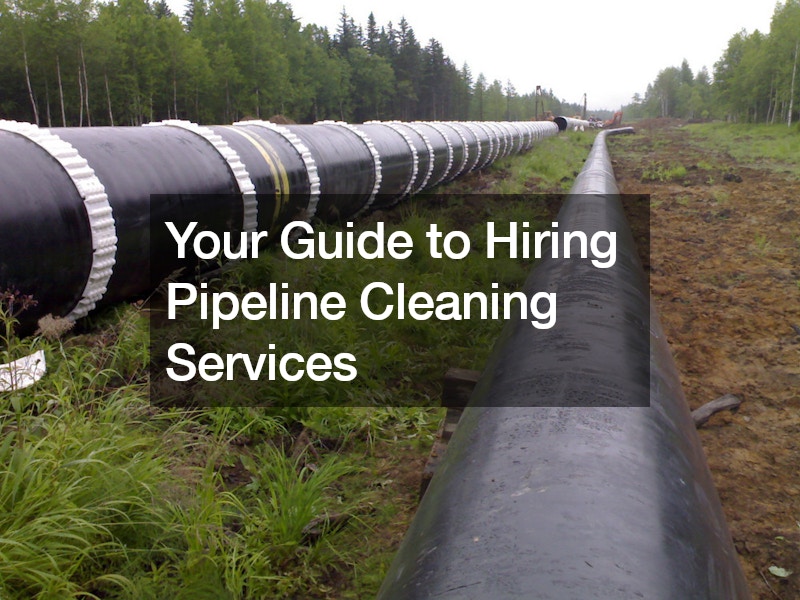
Pipelines are critical infrastructure for industries such as oil and gas, water and wastewater, chemical processing, and more. Over time, pipelines can accumulate deposits, debris, scale, and other contaminants, leading to reduced flow rates, increased pressure drop, and potential corrosion. To maintain the efficiency, integrity, and safety of pipelines, regular cleaning and maintenance are essential. Hiring professional pipeline cleaning services is a smart investment to ensure that your pipelines remain in optimal condition. In this guide, we’ll explore the key considerations and steps involved in hiring pipeline services.
Assessing Your Cleaning Needs
Before hiring pipeline services, it’s crucial to assess your pipeline needs. Determine the type of pipeline you have (e.g., oil, gas, water), its diameter, length, material, and operating conditions. Identify any specific contaminants or deposits that need to be removed, such as scale, wax, sediment, or corrosion products. Consider the accessibility of the pipeline, as well as any environmental or safety considerations. By understanding your pipeline cleaning requirements upfront, you can communicate effectively with potential service providers and ensure that they have the expertise and equipment to meet your needs.
Researching Potential Service Providers
Once you’ve identified your pipeline needs, research potential service providers in your area. Look for companies with experience and expertise in pipeline services, particularly in your industry or sector. Consider factors such as the company’s reputation, certifications, safety record, and track record of success. Read customer reviews and testimonials to gauge satisfaction levels and reliability. Additionally, inquire about the range of services offered, equipment used, and any specialized techniques or technologies employed. Narrow down your list of potential service providers to a select few that meet your criteria and schedule consultations or site visits to discuss your project further.
Conducting Consultations and Site Visits
Before hiring a pipeline cleaning service, schedule consultations or site visits with your shortlisted candidates. During these meetings, discuss your pipeline cleaning needs, objectives, and expectations in detail. Provide information about your pipeline system, including its layout, operating conditions, and any specific challenges or constraints. Ask questions about the company’s cleaning methods, equipment, and safety protocols. Inquire about their experience with similar projects and request references or case studies to verify their capabilities. Evaluate the professionalism, responsiveness, and communication skills of the service provider to ensure a positive working relationship.
Requesting Proposals and Quotes
After conducting consultations and site visits, request formal proposals and quotes from the service providers you’re considering. A comprehensive proposal should outline the scope of work, including the cleaning method, equipment, materials, and timeline. It should also specify any additional services or considerations, such as environmental permits, waste disposal, or post-cleaning inspection. Review the proposals carefully to ensure that they align with your requirements and budget. Compare the quotes from different service providers, taking into account factors such as price, quality, and value-added services. Keep in mind that the lowest price may not always represent the best value, so prioritize quality and reliability when making your decision.
Evaluating Experience and Expertise
When hiring pipeline services, it’s essential to evaluate the experience and expertise of the service provider. Look for companies with a proven track record of success in pipeline projects, particularly those similar in scope and complexity to yours. Inquire about the qualifications and training of the cleaning technicians, as well as the company’s adherence to industry standards and best practices. Consider any specialized certifications or affiliations that demonstrate expertise in pipeline techniques and technologies. Choose a service provider with the knowledge, skills, and resources to effectively address your pipeline needs and deliver superior results.
Ensuring Safety and Compliance
Safety is paramount in cleaning operations, so it’s essential to ensure that the service provider adheres to strict safety standards and regulations. Inquire about the company’s safety protocols, training programs, and safety records. Verify that they have the necessary permits, licenses, and insurance coverage to perform cleaning work safely and legally. Additionally, consider any environmental regulations or compliance requirements that may apply to your project. Choose a service provider that prioritizes safety, environmental responsibility, and regulatory compliance to minimize risks and liabilities associated with cleaning operations.
Finalizing Contracts and Agreements
Once you’ve selected a cleaning service provider, finalize the contract or agreement detailing the scope of work, terms and conditions, and payment terms. By establishing clear expectations and agreements upfront, you can minimize misunderstandings and disputes throughout the duration of the project.
Conclusion
Hiring cleaning services is a critical step in maintaining the efficiency, integrity, and safety of your pipeline infrastructure. By assessing your cleaning needs, researching potential service providers, conducting consultations, and evaluating experience and expertise, you can select a qualified and reliable partner for your cleaning project. Prioritize safety, compliance, and communication throughout the hiring process to ensure a successful outcome and long-term performance of your pipeline system.
.

